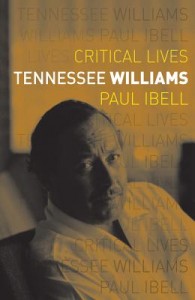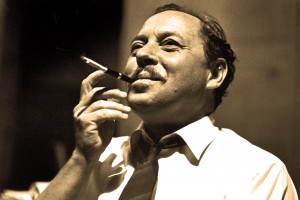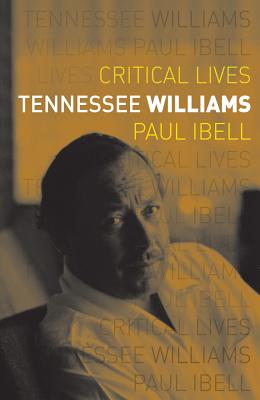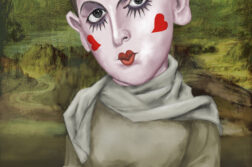 Tennessee Williams
Tennessee Williams
by Paul Ibell
Reaktion Books. 192 pages, $19.
SOMETIMES, in biographies, less is more. As powerful as John Lahr’s 2014 life of Tennessee Williams (Mad Pilgrimage of the Flesh) was, its psychoanalytical approach made it sometimes hard to see the forest for the trees, especially when the forest we were enclosed in was the mind of an artist that Lahr considered to be a hysteric. Paul Ibell’s version is less interior and more of an overview, and that has its uses.
Ibell is an English poet (Love Bites) and journalist (Theatreland: A Journey through the Heart of London’s Theatre), which means this is a British view of the very American playwright. Included are references to British productions of Williams’ work, anecdotes involving people like John Gielgud and Noël Coward (which may not be strictly germane but are irresistibly funny), and references to London audiences, which, Ibell says, have always been warmly receptive to Williams’ plays. However, as Ibell points out, Williams was less than passionate about England. He bolted for the Continent just before the opening nights of both Gielgud’s production of The Glass Menagerie and Lawrence Olivier’s A Streetcar Named Desire, and he wrote during a visit not long after World War II: “An air of hopelessness on this island, the people grim, cold, unpleasant. The upper society quite heartless. Snobs and hypocrites to a shocking degree.” It was Italy that he loved—Italy that gave him actress Anna Magnani and his 1950 novel The Roman Spring of Mrs. Stone.
Like Lahr, Ibell gives us Williams’ life by following the plays, but he quotes his poetry much more often—including the mordantly hilarious “Life Story,” a poem that everyone who has ever had sex should read. And there’s more about Williams’ early life—like the childhood diphtheria that “cost him the use of his legs for two years and led to a change in his personality from relatively outgoing to distinctly shy and withdrawn,” or the trip to Europe that his grandfather took him on when he was young, a visit that deepened his lifelong love of European culture. Then, too, there is a useful chronology. One thinks of Williams as having a golden age of hits followed by a decadent twenty years in which the critics became increasingly contemptuous. In fact, he always had a mix of hits and flops. The Glass Menagerie was followed by You Touched Me! After The Rose Tattoo came Camino Real. And Period of Adjustment intervened between Sweet Bird of Youth and The Night of the Iguana. In other words, it was a mixed bag all along.
Nevertheless, Ibell tries hard to rescue the plays that the critics serially panned after his last commercial hit, The Night of the Iguana. Plays like And Tell Sad Stories of the Death of Queens, Steps Must Be Gentle, and Now the Cats with Jeweled Claws were experimental, openly concerned with homosexuals, and mostly one-acts. And they remain obscure today. The critics Ibell compares to “a firing squad” complained that Williams was working the same tired themes over and over, but their refusal to let him try new things—inspired by younger playwrights like Joe Orton and Harold Pinter (both of whom Williams admired)—was, he said, like refusing to allow Picasso to move beyond the Blue Period. His last full-length play, A House Not Meant to Stand, couldn’t even get produced in New York, because Williams was no longer bankable at that point. The Times didn’t even bother to send anyone to review it when it was done in Chicago.
 As for the main theme that dominated both his flops and hits—sex—Ibell argues that in Williams’ work (and life) it stood not only for liberation but also for violence and death. As Williams aged, Ibell says, he became ever guiltier about the predatory nature of his desire—particularly while coming to terms with his partner Frank Merlo’s death from cancer, as described in Williams’ admirably self-critical (and vastly entertaining) Memoirs.
As for the main theme that dominated both his flops and hits—sex—Ibell argues that in Williams’ work (and life) it stood not only for liberation but also for violence and death. As Williams aged, Ibell says, he became ever guiltier about the predatory nature of his desire—particularly while coming to terms with his partner Frank Merlo’s death from cancer, as described in Williams’ admirably self-critical (and vastly entertaining) Memoirs.
Ibell’s description of the playwright’s last days echoes Lahr’s dramatic rendition—his farewell to Key West, the hotel room in which he died in Manhattan—and the two biographers end up in the same place, really, when it comes to what drove Williams: “All he really cared about was his writing,” Ibell writes. “The insecurity and problems that it brought were not because he loved money or position and wanted to cling to them, but because he cared, desperately, about the value of his work.” Williams himself was even blunter: “It is only in his work that the artist can find reality and satisfaction.” The problem was, as Ibell puts it: “His self-worth … was dependent on the way his work was received.”
There are minor errors: Truman Capote died of liver disease, not cancer; the young man who knocks on the door in Streetcar is collecting for the newspaper, not a charity; it’s Mrs. Venable, not Venables, in Suddenly, Last Summer; and Gore Vidal’s social standing in Washington was surely based on his grandfather’s having been a senator, not just his mother’s remarriage to Jackie Kennedy’s stepfather. But these do not detract from this witty, intelligent, and deeply sympathetic book. Anyone who composes a biography of someone who has already been written about a great deal is inevitably an aggregator, an amalgamator, a food-taster, if you will, who devours everything and then offers up what he thinks most important or interesting. That is what Ibell has done.
This biography will interest people who’ve read previous treatments, because few of us have read them all. Using the poetry, short stories, novels, journals, Williams’ own memoir, and previous biographies like Lahr’s (which Ibell calls “magisterial”), this latest rendition is bound to tell you things you didn’t know or have forgotten—like the fact that Capote created in Answered Prayers a malicious portrait of Williams as a character named Mister Wallace for whom “everyone else is an audience”; that Williams’ father, who’d called Tennessee “Miss Nancy” when his son was growing up, said, after seeing the much-denounced Baby Doll, “I think it’s a very fine picture and I’m proud of my son”; or that Williams was furious with the film version of Suddenly, Last Summer for showing the urchins cannibalizing Sebastian, something he felt should have been left unseen. Ibell’s book is full of interesting details like these. And biography is in the details. Plus, the photographs are marvelous.
Andrew Holleran’s novels include Dancer from the Dance, Grief, and The Beauty of Men.





